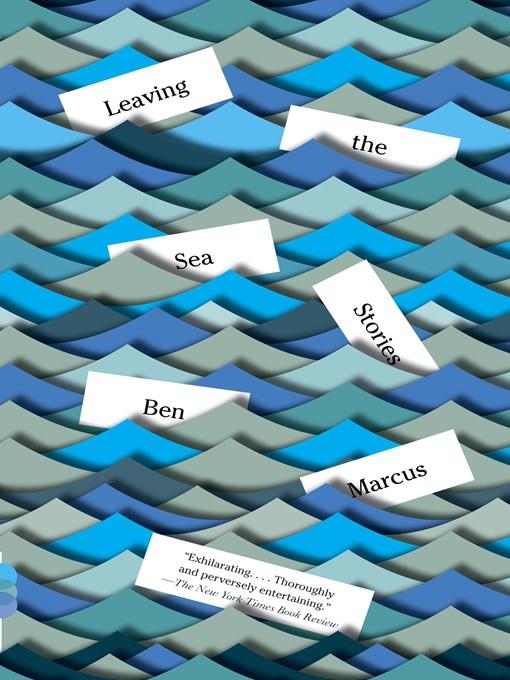
Leaving the Sea
Stories
- اطلاعات
- نقد و بررسی
- دیدگاه کاربران
نقد و بررسی

July 22, 2013
The second collection from Marcus (The Flame Alphabet) is a peculiar, funny, original analysis of the human psyche and modern language. Split into six parts, the volume fluctuates between traditional narrative (the opener, “What Have You Done?,” acts as a “stranger in a strange land” tale: a man reluctantly visits his family, only to learn his present self cannot erase memories of his younger, wilder past) and more experimental fare (the title story, for example, unspools in one breathless, exhilarating sentence). Communication is important to the author, and throughout, characters employ unusual linguistic skills, renaming common tasks (sex becomes “lust applications”) and speaking about common phrases as if they are alien (“These changes in temperatures were called moods and they had interesting foreign names, but I no longer recall them,” the narrator in “First Love” muses). The protagonists of most of the stories are men, and often their conflicts are flared by worried, overactive imaginations. “The Moors” plots the increasingly elaborate digressions of a man as he trails a coworker to an office coffee machine, spiraling a mundane experience into a psychological death march, while “Watching Mysteries with My Mother” and “The Loyalty Protocol” parse the responsibilities of caring for aging parents. A very strong collection. Agent: Denise Shannon, Denise Shannon Literary Agency.

October 15, 2013
Fifteen tales of modern anxiety that display Marcus' range, from angry realism to mind-bending allegory. Marcus (The Flame Alphabet, 2012, etc.) front-loads his latest collection with four works of unabstracted, relatively frictionless storytelling. "What Have You Done?" tracks a man at a misery-filled family reunion, unable to address what's estranged him (a sex crime is implied) but unable to explain his rehabilitation either. In "I Can Say Many Nice Things," a writing teacher's gig on a cruise ship only underscores his sourness. And "The Dark Arts" and "Rollingwood" deal with men at awful turning points, one being treated for a blood disorder in a German facility, the other raising a toddler while his estranged wife is absent and his job collapses. All dour themes explored by dour men, but Marcus has mastered a bitterly comic tone and a level of psychological insight that make the characters more than repositories of middle-age rage. The remaining stories play more freely with tone and structure, with varying degrees of success. "The Loyalty Protocol," which focuses on a community that responds to an unnamed apocalyptic shift with constant drills and brutal exclusionary tactics, evokes the chilling tone of Shirley Jackson's "The Lottery." But in stories like "The Father Costume," in which people "speak" in cloth, or "Origins of the Family," where bones are society's chief construction material, Marcus pushes metaphor to its breaking point, making for sketches that are more intriguing than evocative. He gets to have it both ways, though, in the closing story, "The Moors," a slow-motion study of a man's trip to his office's coffee cart. Its focus on picayune detail and a synapse-firing-by-synapse-firing exploration of the protagonist's despair suggests Nicholson Baker in a sour mood. But the effect is at once smart, claustrophobic and comic. Thoughtful, sometimes-exasperating, boundary-pushing fiction.
COPYRIGHT(2013) Kirkus Reviews, ALL RIGHTS RESERVED.

September 1, 2013
Here's a mixed bag of 13 stories from the well-regarded Marcus (The Flame Alphabet), a three-time Pushcart Prize winner and recipient of the Whiting Writers' Award. About half are quality "conventional" short fictions: "Rollingwood" shows a man fighting the odds and an ex-wife-from-hell to make a life for his ill son; "I Can Say Many Nice Things" is a wry take on a down-at-the-heels professor leading a writers' workshop on a cruise ship(!); "What Have You Done?" offers up a dysfunctional narrator at his dysfunctional family's reunion. The others range up and down the scale of "experimentalism" from the fairly interesting to the absolutely self-absorbed. "On Not Growing Up" (about extended--into one's seventies--infancy) and another are in interview style. The title story is, except for the last few lines, one five and a half-page-long sentence winding its way toward insanity. "First Love" is futuristic sci-fi-ish, and very few readers will read it through or even wish they'd ever seen it. VERDICT The two halves offset each other, but the entirety will appeal almost exclusively to the avant-garde. [See Prepub Alert, 7/22/13.]--Robert E. Brown, Oswego, NY
Copyright 2013 Library Journal, LLC Used with permission.

Starred review from December 1, 2013
Too often, the label speculative fiction catches a bad rap, conjuring dragons, wizards, and warlocks. But Marcus, author most recently of the engrossing, apocalyptic novel, The Flame Alphabet (2011), articulates every grade of the uncanny, with masterful attention to the twisted vortices of language. This new collection includes brilliant, unsettling stories of strange worlds and estranged men, frequently tempered by inexplicable illness. In Rollingwood, a corporate manager is left stranded when the mother of his asthmatic son disappears, forcing him to deal with his delicate, reddening child. In The Dark Arts, an American medical tourist travels to Europe for stem-cell therapy to treat a mysterious, autoimmune allergy to himself, only to be abandoned by his girlfriend. Unmatched in his imagining of the human form, Marcus transforms the body into an object with holes bored into it, a transparent burlap sack, and a figure sketched in light. But it's not all macabre corporeality. A story of a wayward creative-writing professor who conducts a cruise-ship workshop is a downright hilarious and ingenious work of wry metafiction. Recommended especially for fans of speculative fiction that stays grounded in emotional honesty, like that of Donald Barthelme, Blake Butler, and Curtis White.(Reprinted with permission of Booklist, copyright 2013, American Library Association.)




دیدگاه کاربران